In recent years, I’ve made a shift to try to live a more sustainable life. I haven’t done anything extraordinary but small actions that take barely any effort add up over time. Here are some things I do to live more sustainably in France.
First, here’s why sustainability is important:
Sustainability is important for a very simple, very straightforward reason: we cannot maintain our quality of life as human beings, the diversity of life on Earth, or Earth’s ecosystems unless we embrace it. There are indications from all quarters and from the smallest to the largest scale that sustainability is something we must address. We will run out of fossil fuels. Thousands if not millions of animal species will become extinct. We will run out of lumber. We will damage the atmosphere beyond repair… If we don’t change.
And the root of that change lies in understanding and striving for sustainability—in our own homes, in our communities, in our ecosystems, and around the world.
Just one quick thing. My choices aren’t superior to anyone else’s. I don’t think that way and I’d never judge someone else for making a choice that feels right to them. There are many sustainable practices I haven’t implemented yet, so I’m by no means an expert. We all do what works best for our values, priorities, and wallets.
For me personally, the things I’ve learned have made me want to shift my habits where I’m able to, so I have. They’re just little choices that help me to do my part in making the planet a better one. And I hope to add more to the list as time goes on.
Our choices do have an impact, both good and bad, so why not do our best to make them good ones? There’s so much we can’t control in this world and making sustainable choices helps me feel more in control.
Also, while there is an environmental movement in France (and elsewhere), it’s not entirely France and its social causes that have made the biggest impact on my personal shift to live more thoughtfully in regard to the environment. The main reason why I’ve focused on living a more sustainable life goes back to educating myself and I credit blogging for that.
I’ve learned so much from my readers and other bloggers about how to make better choices for the environment and our fellow humans. Being in this space has me researching and reader others’ content all the time — well outside my niche — and I never would have sought all of that out living back in the USA without a blog.
Here are 5 small things I do to live a more sustainable life in France:
Make my own coffee instead of getting it to go
I’m starting with the easiest one. I nail this every morning! Back in NYC, I probably trashed at least 5 paper, plastic, or Styrofoam to-go cups and straws per week. But now? Less than one every couple of months. Really. But I can’t take all the credit for this one.
It just so happens that in my area of France, to-go coffee isn’t really mainstream, so I make my own brew each morning because it’s the most convenient. I either use a single-cup cone, as shown above, or use my French press. There’s no Starbucks or any type of to-go coffee shop in walking distance, so even if I wanted to grab a latte on the go, it’s just pas possible.
I feel good about making my own coffee each morning (well, except for that one time when I had a plumbing disaster) and love my alone time that goes with it in front of my laptop. I feel even better knowing I’m not contributing the amount of to-go cups in the trash anymore.
Walk as much as I can
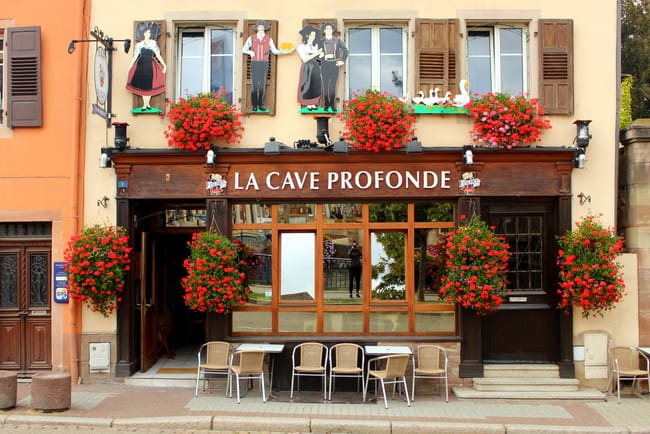
Saverne, France
We purposely bought our house in the center of our town so it’s easy for me to walk to the grocery store, gym, bank, post office, and pretty much anywhere else I need to go. Tom and I share a car and we try to leave it parked as much as possible. It’s better for the environment and our wallets, since gas is quite expensive in Europe.
That’s not to say that French people all walk everywhere, though. In cities, yes, people walk a lot. Parisians and New Yorkers are a lot alike in that respect since most people don’t have cars and rely on mass transit and their own two feet. It’s good exercise and I always do my best thinking when I’m out walking around, so I’ll continue to walk places as much as possible.
Choose ethical and sustainable clothing brands whenever possible

Dress: prAna
Over the years, I’ve become more aware of ethical and sustainable manufacturing processes and have taken a strong liking to brands who make it a point to do good in the world. Basically, sustainable clothing respects the planet and its people and that’s something I can get behind. Whenever possible, I try to support companies with sustainable practices.

Dress and coat: prAna
One company I’ve supported for years is prAna. They make sustainable 100% organic clothing that’s fair trade certified and it’s what I’m wearing in the photos in this post. They have beautifully made outerwear, activewear, travel and adventure clothing, and more for both men and women.
I feel better knowing where my clothes are coming from and that the people making what I put on my body are fairly paid and working in safe conditions. I want to continue expanding my wardrobe to contain more sustainable options.

Dress and coat: prAna
Lastly while on this topic, I’m the first to admit it’s NOT always possible to buy sustainable clothing. Many brands can be expensive but it’s important to start small and buy whatever your budget allows — a t-shirt, socks, undergarments. A small step is better than no step at all.
One of my favorites for basics (and beyond!) is Everlane.
5 Ethical clothing brands in France you need to know about >>
Eat locally
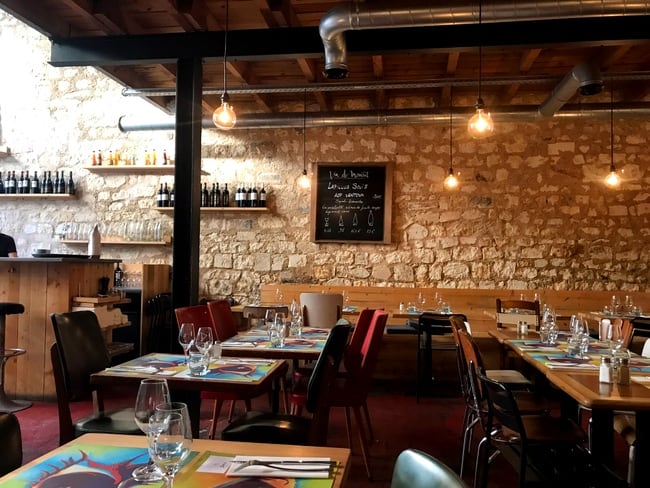
Prao Restaurant in La Rochelle, France
France’s food culture makes this next one easy. One of the things I love about France is that many restaurants pride themselves on offering local fare. The vast majority aren’t serving local, seasonal cuisine to be trendy, though. They’re embracing the farm-to-table model because local offerings are often the most cost effective and there’s no shortage of amazing French products to put on the menu.
From fresh seafood and produce, to wine made with locally harvested grapes and dairy products from animals raised in the region, there’s something for every type of menu pretty much wherever you go in France.
Eating locally is a cultural experience but it also means that the food tends to be fresher and reasonably priced since restaurants don’t have to pass the cost of importing 90% of what’s on the menu onto the customer.
When I have the choice between a restaurant that serves dishes made with local ingredients versus not, I always choose local and support close-to-home wine producers, farmers, etc.
Etiquette tips for dining out in France and wowing your dining companion >>
Use reusable grocery bags, a shopping trolley, etc.
When I was still living in the USA, there was always the option of getting paper or plastic grocery bags at the register. In a single trip, you could accumulate five or more bags that would find their home in the trash. Some grocery stores even started offering a small discount of 5 or 10 cents for shoppers who brought their own reusable bags as an incentive.
Little by little, bringing my own bags became the norm back in the USA and that habit has carried over to my life in France. Life here has actually reinforced that habit because free paper or plastic bags given out at the register is not the norm at all.
In most grocery stores in France, you need to bring your own bags or you’ll have to pay to buy some. So bring reusable bags or wheel a shopping trolley to the grocery store if you don’t want to be caught by surprise. Either option is better than going home with bags you’ll end up trashing after just one or two uses.
My top tips for grocery shopping in France >>
***
Have you made any shifts toward sustainable living after moving to France?
PIN MY SUSTAINABLE LIVING IN FRANCE POST:
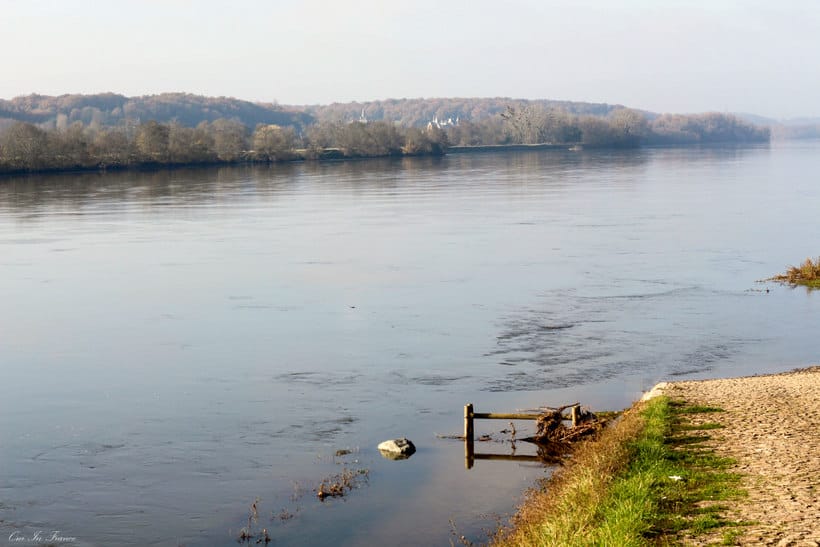

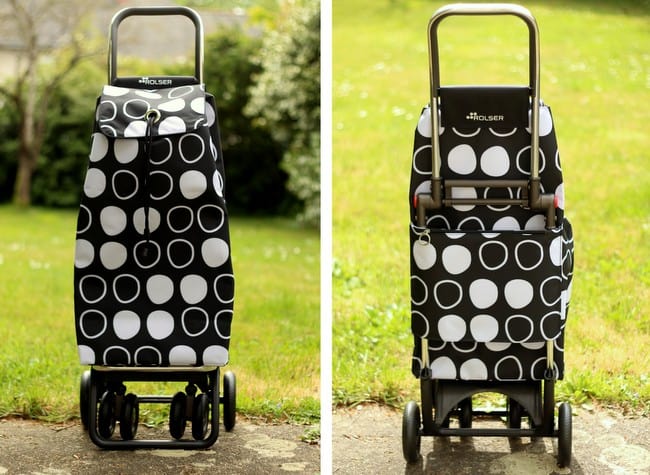


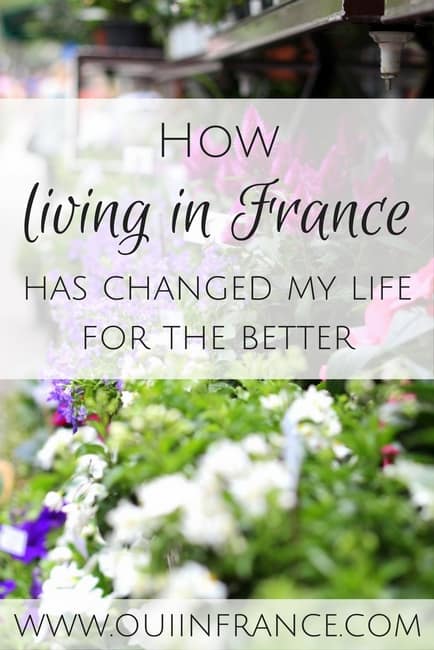

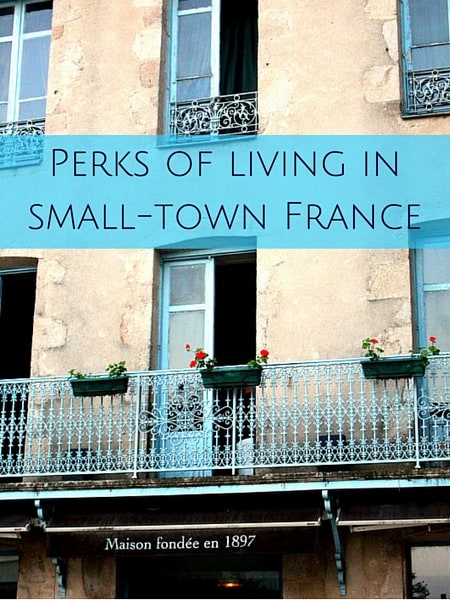

I agree with you that being sustainable has become the No. 1 theme of my life. And France makes it easy.
Believe it or not, recycling is taught in school here. My kid routinely passes judgment on everything, based on what the prof taught. We have a few plastic bags for the market which we reuse even though they’re full of holes–we don’t throw them away until they are completely useless. Often we forgo bags altogether (easier at the market than at the grocery store, which wants you to put stuff into a bag, weigh it and seal it with the sticker showing the price). The other thing is that vintage and secondhand shops have really taken off in France. Antique furniture has always been a thing, and even modern young folk would have furniture that has been handed down through multiple generations. Happily, it has caught on with clothing, too. And, of course, in larger cities, public transport is excellent and more and more cities have shared bike programs. No need for cars.
Yes, all good points, especially about the vintage shops. I remember being a 15-year-old teenager and going to NYC with my mom and some friends to do trendy vintage shopping back in the day. I’m glad that’s one thing that’s stuck around.
France’s public transport is excellent. I’m always happy to see bus lines even in small towns that are in the middle of nowhere. It’s a necessity when gas prices are so high!
Hi Diane,
It is so wonderful that you are promoting a thoughtful lifestyle of meaningful living with less. These days there are so many bloggers and YT-ers talking about reducing waste, using less, upcycling and recycling thus giving me hope that at some point we all are going to reach a critical mass and produce major changes in industries and public policies.
Until then, each of us must do as much as we can, where and when we can. Your ideas are so simple but yet so impactful. Everyone can brew their own coffee and tea and carry a reusable bag in their purse to have it handy. Everyone can transition to a minimalist wardrobe with only natural fabrics and no polyester. I believe in the power of many making small changes for a big impact. I recently found out about a clothing company – Social Work – from NY ( where else?! ) which gives customers the name and a picture of people who made the garments. In California there is a big riot about the ban on straws at the fast food places. Kindergardners are making animals out of recicled materials. These are good signs of major changes coming. Good topic to discuss.
Thanks so much, Niculina. I hope that by sharing some changes I’ve made, that I’ll help others to make changes in their own lives or at least bring awareness to the cause. That way people’s curiosity will lead to research, like it did in my case. I’m ashamed to admit that I didn’t realize the full impact of fast fashion until I watched a Netflix documentary about it. I didn’t realize how pervasive the plastic problem was in our oceans until my brother told me about a friend’s company that cleans up the oceans (he discovered how bad the problem was when sailing in the Pacific and decided to do something about it). I have many examples like that. So we learn, we adapt our habits where we can, and hope it’s enough to make some kind of difference. Nice to hear you’re of a similar mindset. 😉
When I could walk without pain I did so, I walked my daughters to and from school and down to the local shops now I can barely stand let alone walk. I started taking my own shopping bags 20 years a go and still do so whenever I go shopping
Hi Diane
Great post on how to start on the path of sustainability. No matter how small every little will help. I grew up not knowing what consumerism was. I learnt this after I moved to the West and did.not take to.it. I live in France now and while there are lots of areas of good practice like local markets and cheap public transport there is also a lot of damage in the countryside with pesticides destroying the fragile eco system and people drive everywhere. Our friends think I am crazy to walk to their house only 400 metres away. We as individuals together can make a difference but attitudes at a corporate level need to change as well. I will check out pr Ana as I haven’t heard of them as I only buy ethically sourced garments. Thete are lots of individuals working in the background researching and manufacturing sustainable products now so no excuses. Your blog and others like it hopefully will be influential in changing some attitudes to making small changes towards a more sustainable lifestyle
We’ve been trying to live more sustainably too. Like you say, with food, it’s pretty easy in France because the French prefer local, seasonal produce and I refuse to buy things out of season that have been flown half way across the world.
We’ve been trying to cut down on plastics too and have changed to using a soap bar instead of shampoo and soap for body wash too. I’ve been impressed with the ones from H20 at Home as they last a long time and leave my hair feeling nice and soft (it also has a great aroma – another one I tried smelt like I was trying to get rid of nits! ).
I invested i some beeswax wraps to replace using plastic film in the kitchen (still working on that one though) and always have a bag with me (even one neatly folded in my handbag just in case).
It’s only little steps I know but I feel better doing them and hope to make bigger steps in the future.
Hi Cathy, yes I got some beeswax wraps for Christmas and I try to use them as much as I can but find that I end up wasting food because things get lost in the fridge and unlike plastic wrap you can see through, the patterns make it hard to remember what’s in the bowl and then carelessness on my part results in food being put in the trash. And I find they’re harder to secure to a glass container. Still trying to figure out the best practices with the wraps.
Like you said, it’s all about the little steps that add up over time. 🙂 Thank you for sharing!!